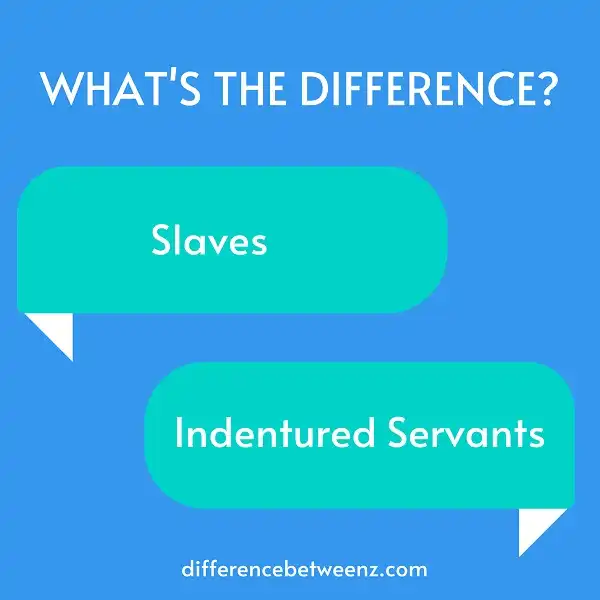The difference between slaves and indentured servants is a historic one that is often blurred. The two were not the same, although they both served to fill labor needs in America. Indentured servitude was an agreement between two parties, where the servant would work for a number of years in exchange for passage to America and freedom at the end of their term. Slavery, on the other hand, was when one person bought another person and kept them as property. Although indentured servitude declined during the eighteenth century, slavery continued to grow. This disparity can be attributed to numerous factors such as racism and economics. By understanding the distinction between these two forms of labor, we can better appreciate America’s complex history.
Who are Slaves?
Slavery is a system under which people are treated as property and forced to work. Slaves can be held against their will from the time of their capture, purchase or birth, and deprived of the right to leave, change jobs, or receive payment for their labor. Slavery is illegal in every country in the world, but it still exists. Slaves may be held in bonded labor, domestic servitude, agricultural work, forced marriage, child soldiers or sexual slavery. Slavery has existed throughout history and across cultures. Slaves have typically been drawn from conquered peoples, though they have also been enslaved by members of their own community.
In some cultures, slaves were considered members of the family and given certain rights, while in others they were seen as property with no rights at all. Slaves have sometimes rebelled against their conditions of servitude, but more often they have sought to escape them. Slaves who successfully escape are known as “fugitives.” Slavery is a violation of human rights and is considered a crime against humanity by international law. Slavery must be eradicated if we are to achieve a world in which everyone enjoys the dignity and freedom that is their birthright.
Who are Indentured Servants?
Indentured servants were men and women who signed a contract (indenture) in exchange for passage to America. Indentured servitude was often used as a means of paying for passage to the colonies. It was also used as a form of punishment for crimes, or as an alternative to imprisonment. Under an indenture contract, an individual agreed to work for a certain period of time – typically four to seven years – in exchange for their passage, food, lodging, and other necessities.
At the end of their term of service, they were free to go their own way. Indentured servants were found in all the British colonies, but they were most numerous in Virginia and Maryland. In the early 1600s, indentured servants made up as much as 80% of the Chesapeake Bay colony’s population. However, by the early 1700s their numbers had begun to decline, as more and more colonists began to acquire slaves.
Difference between Slaves and Indentured Servants
Slaves and indentured servants were both subject to forced labor, but there were a few key differences between the two. Slaves were owned outright by their masters, whereas indentured servants had to work for a set period of time – usually four to seven years – in order to pay off their passage to America. Once their term was up, they were free.
Slaves, on the other hand, were considered property of their masters for life and could be bought and sold as such. Additionally, slaves were not legally allowed to marry or own property, while indentured servants were. Finally, indentured servants could eventually gain their freedom and become citizens, whereas slaves could not. While both groups faced hardship, slaves arguably had it worse since they didn’t have any hope of ever achieving freedom.
Conclusion
The distinction between slaves and indentured servants is an important one to understanding the history of early America. By understanding the difference, we can appreciate the progress that has been made in terms of human rights, and continue working towards a more perfect union.


